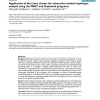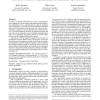769 search results - page 53 / 154 » Analysis of recursively parallel programs |
BMCBI
2008
13 years 9 months ago
2008
Background: Genetic association studies have been used to map disease-causing genes. A newly introduced statistical method, called exhaustive haplotype association study, analyzes...
POPL
2012
ACM
12 years 4 months ago
2012
ACM
We present an analysis which takes as its input a sequential program, augmented with annotations indicating potential parallelization opportunities, and a sequential proof, writte...
CAV
2007
Springer
14 years 3 months ago
2007
Springer
We present Hector, a software tool for combining different abstraction methods to extract sound models of heap-manipulating imperative programs with recursion. Extracted models ma...
PPOPP
2010
ACM
14 years 6 months ago
2010
ACM
We present a core calculus with two of X10's key constructs for parallelism, namely async and finish. Our calculus forms a convenient basis for type systems and static analys...
ISCA
1992
IEEE
14 years 27 days ago
1992
IEEE
This paper discusses three techniques useful in relaxing the constraints imposed by control flow on parallelism: control dependence analysis, executing multiple flows of control s...


